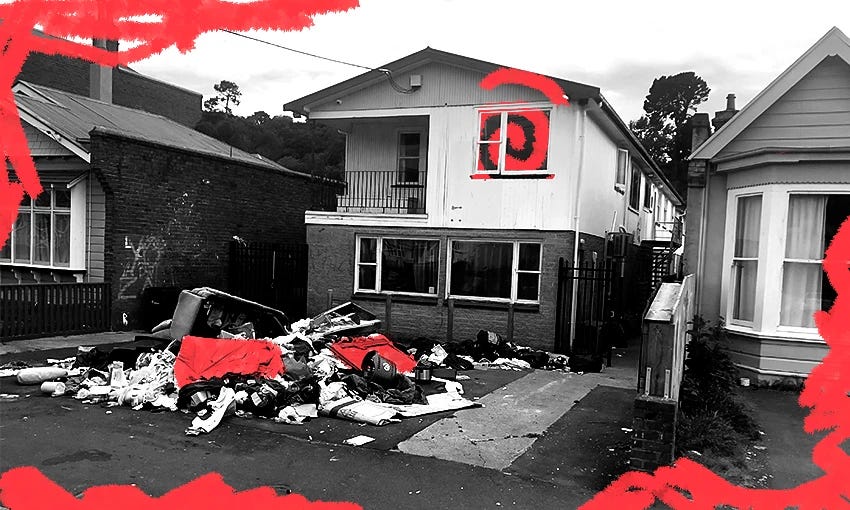Stan Walker embraces his Tūhoe belonging
Also: student hazing, precarious housing and remembering Fa’anānā Efeso Collins.
Kia ora and welcome to The Weekend. I have decided to make an etiquette declaration: if you’re in the middle of a conversation and suddenly want to reference something you’ve seen on your phone (a photo! a meme! a particularly amusing Instagram post from your sister in law!) do not give into the desire to pull your device out and poke around until you find it. It derails conversations and means that whoever you’re talking to has to sit there while you search through your messages from 2019 to prove a point that is never worth the time spent finding the article of digital ephemera. I have been guilty of this many, many times and I am hereby swearing off the habit. Unless the screenshot of my brother’s Spotify Wrapped is extremely pertinent to a point about the listening habits of engineers…
-Shanti Mathias, staff writer
Stan Walker on Tāme Iti, Tūhoetana, tamariki and tunes
More than a decade after Stan Walker found fame on Australian Idol, he’s now proudly representing his Māori heritage, including in new waiata entirely in te reo. Tommy de Silva sat down with him for an interview earlier this week. “He was so easy to talk to — he’s a chill, funny guy,” Tommy told me. “It was a conversation where we used his new music as a springboard to talk about his Māori identity — it was really interesting to get an insight into one of the more famous Māori musicians.” Walker rocked up in leather pants and a beanie, despite 28 degree weather, having just gotten off a flight from LA — really showing his stardom, as well as his passion about building a better future for the next generation.
Join our community of supporters
Since the start of the year, Spinoff readers have helped fund some of our most popular and important work. Our newly launched editorial series War for Wellington, coverage of Waitangi Day, explainers of te Tiriti, impactful essays, investigative journalism, beloved podcasts and more.
Whether you read, listen to or watch our mahi, you can support us to do more by donating today or signing up to become a Spinoff member.
How a culture of abusive hazing came to be
Fox Meyer, former editor of Otago’s student magazine Critic, spent the summer working on a three part series on the cruelty, performance of poverty and violence inherent in flat hazing rituals in Dunedin, published in The Spinoff this week. “The surprising thing was how powerful the culture of hazing is — it survived the shift from hall to flat hazing, as well as the pandemic,” he told me. He was amazed by how openly people were willing to talk to him about the cruelty they had endured and handed down to others. “People gloat about what they did, as if they don’t understand the magnitude of it — they are often admitting to a crime.” While only a few thousand students, mostly first and second years, participate in the extremes of student culture seen on Castle Street, it becomes something the entire university is known for — even if there’s not much the university can do. “I want people to understand that there is something insidious about this behaviour, it’s a deep-set cultural problem: you can’t pin responsibility on one individual, and you can’t easily assign blame, because the abuser one year was abused the year before.” Fox has written pieces about the history of hazing, the impact of media coverage and how wealth and privilege are embedded within the squalor.
Ia manuia lau malaga, Fa’anānā Efeso Collins
A quote from Madeleine Chapman’s obituary for Fa’anānā Efeso Collins, the remarkable Sāmoan MP and former Auckland councillor who died suddenly on Wednesday. “Fa’anānā was not a party man, he was a people man. His concerns were entirely about how best to serve his people, rather than any party, and for a while it seemed he had no interest in advancing his own career beyond his community. In 2017, he spoke of his feelings towards the political system and Pacific leaders within it. “My own people may be unhappy with my views, but I believe that a lot of Pacific politicians have been giving into a system that’s feeding them but that’s not bringing our people forward,” he said. “There’s a whole lot of rhetoric around the rising tide lifting all the boats. But too often the rising tide is only serving white middle-class New Zealand.”
Thought there was no more Bad News? You were wrong!
Why does no one care that the world is ending? How will we all survive when everything falls apart? If you’re haunted by these dilemmas, then Alice Snedden’s new two-part special is coming next week to save you. Premiering Tuesday, 27 February on The Spinoff, Alice Snedden’s Bad News Saves the World sees her learning to light fires in the bush and asking if societal collapse is inevitable. Can someone fix climate change in 20 minutes? Watch and find out as Alice prepares for the worst and Alice picks a fight with farmers (in the name of Rose Matafeo). Made with the support of NZ On Air.
11 flats in 11 years
Since Preyanka Gothanayagi moved to Wellington she’s lived in 11 houses. In an essay this week, she reflects on what each one taught her about the state of housing in the city, as the council debates the District Plan. “I’ve had good landlords and bad property managers; the rare sunny room and that Wellington rite of passage, mould in the walls. Every move felt inevitable, the result of circumstance, like I was a helpless leaf being blown about in the housing equivalent of Wellington’s ridiculous winds. But looking back, there were patterns. If I’d had the option, I would have rented an apartment on my own, and built a cosy, safe paradise. But every time I went flat hunting, I couldn’t afford the bare minimum. Moving 11 times is rough. It always costs you to leave a home, and not just financially. It’s hard to put down roots if you don’t stay in one place.” Read the whole piece here.
The old town and the new city: how the council byelection result is a clash of two Wellingtons
The rules that force people receiving income support to stay single
It’s 2024, and despite years of criticism, benefit rules still mean that many people can still get their benefits drastically reduced within weeks of starting a new relationship. Gabi Lardies reports. “It’s depressing,” reads a comment from a solo parent in the Mako Mama report, “I feel so lonely, unwanted and undervalued.” The writer was “terrified” that someone might tell Winz if they were seen on a date. Another single parent wrote, “I’ve had to consider whether the benefits of a secure loving relationship were worth the financial cost”. The people surveyed called the rules stupid, humiliating, a cause of shame, bogus, complicated, risky, anxiety inducing and ridiculous.” Minister for social welfare Louise Upston has said she plans to look at whether rules will be improved, but hasn’t included any other details.
Food poverty is felt most by Māori, Pasifika and disabled kids
Everything else
“I’m tired but they’re dying” : the reality of life as a Palestinian New Zealander
Extremely comprehensive story about the government’s 100 day plan — what’s been done and what is left to do
Some stunning, heartbreaking stories about the impact of homelessness from people living through it
The inspirations behind new comedy-drama show Miles From Nowhere
A menopause reading list, plus interviews with women speaking about menopause from around the world
I loved this advice column about what to do when a friend gets you AI art as a gift
Why the Sky Tower is Aotearoa’s only iconic building
A very joyful story about teaching kids to love mud (and the natural wonders among it)
The Spinoff tasted 18 non-alcoholic beers and the results will SHOCK you
How Finland halved its suicide rate
I am always telling people about this old, excellent story about why advanced technology can’t stop printers from always malfunctioning
Inside Wonky Box, the business that’s rescued over two millions kilograms of imperfect produce
Fascinating interview about violence against women and oppressive economic structures in Latin America
And finally, Stewart Sowman-Lund talks to Tim Batt and Guy Montgomery about The Worst Idea of All Time — which became the best idea of the decade
















